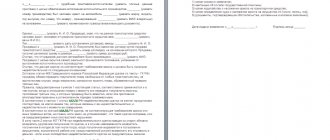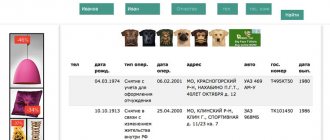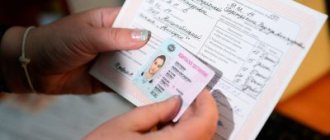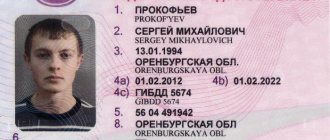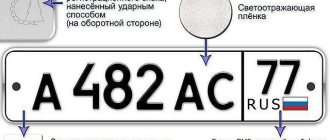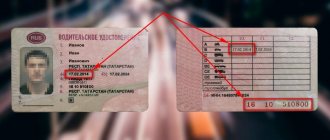Why might a car be impounded?
An arrest involves the imposition of a ban on the disposal or use of property belonging to the debtor (defendant, suspect, accused), and in some cases the seizure of such property.
A car, like any other property, can be subject to seizure. Accordingly, registration of transactions with it (for example, purchase and sale) while under arrest is impossible.
The court or bailiffs can impose an arrest. It should be understood that the seizure of property is not a punitive measure. The main purpose of the arrest is to ensure the execution of a court decision to collect the amount of debt from the debtor, confiscate property, etc.
The car will be released from seizure if the grounds for its imposition are removed. For example, there is no need to apply arrest if the debtor has fully repaid the amount of debt.
As for the reasons for the seizure, there may be several of them. The most common:
- the owner of the car has a debt on a loan, for utilities, etc., the collection of which is carried out by bailiffs according to a writ of execution;
- initiation of a criminal case against the owner for crimes, as an additional punishment, for which confiscation of property is provided;
- filing a civil claim against the owner for debt collection, damages, or if the subject of the dispute is the car itself.
Why the bailiffs seized the card - reasons
A Sberbank card is not simply seized.
Among the reasons why this unpleasant situation occurred are:
- failure to pay alimony for children and a pregnant spouse or for the maintenance of parents;
- debts for housing and communal services;
- tax arrears, including personal income tax;
- debt for non-payment of state duty;
- compensation for harm to health, moral damage or damage to property;
- debts on loans and mortgages;
- failure to pay an administrative fine, including the traffic police fine;
- collection of interest.
Reasons why a seizure may be imposed and further debits of funds from a Sberbank card may be made.
The basis for the seizure of a Sberbank card by bailiffs is a resolution that the bailiff service sends to the bank. Sberbank is obliged to respond to the resolution, otherwise the responsible person will be fined.
In addition, other documents provided for by the law on enforcement proceedings can act as a writ of execution, for example:
- court order for debt collection;
- a notarized agreement on the payment of alimony (concluded between spouses);
- decision of the labor dispute commission;
- act of an authorized federal service or other executive and regulatory bodies (for example, traffic police, Federal Tax Service, Pension Fund, etc.);
- documents on extrajudicial foreclosure of pledged property, certified by a notary.
In addition, the bank accepts for execution documents sent to the debtor by foreign competent authorities if they are completed in accordance with all international standards.
Ways to check a car for arrest and restrictions
There are many services that allow you to obtain information about a car, fines, and transactions with it. Such information can be provided by both public authorities and private organizations. The most famous state information resources are:
- service of the State Traffic Safety Inspectorate of the Russian Federation;
- service of the FSSP of the Russian Federation.
In addition to these resources, information about the car can be obtained on the portal of the Moscow government (for residents of Moscow and the Moscow region), on the website of the Russian Union of Auto Insurers, etc.
By VIN code
A VIN code is a unique vehicle identifier that is known to a limited number of people. Therefore, most services use it to check seizures, restrictions and obtain other information.
For example, to check using the traffic police database, you need the VIN code.
By license plate
With only the license plate information available, checking to seize the car is impossible.
However, by entering the car number on the traffic police website in the request field, you can find out, for example, about the presence of fines imposed on the owner for traffic violations. At the same time, knowing the car number, you can use the database of the Union of Auto Insurers to find out the VIN code:
- On the website of the Union of Auto Insurers, enter the car number in the request form. The service will indicate the MTPL policy number.
- Open the “Information about insured vehicles” tab and enter the policy number in the request form. The service will indicate the vehicle's VIN code.
How to check a car for arrest on the traffic police website
All data on prohibitions on registration actions, as well as the arrest of vehicles, is accumulated in the State Traffic Safety Inspectorate of the Russian Federation, because it is this government body that is authorized to carry out registration actions with cars. For the convenience of citizens, the State Traffic Safety Inspectorate website has a service for checking cars based on restrictions on registration actions.
After opening the service, in the “Vehicle Check” window, enter the VIN code. Checking is also possible using the body or chassis number. From the four check types below, select the last one: “Check for restrictions” and request a check.
If the data entered by the user matches the number (VIN code) in the database of the State Traffic Safety Inspectorate of the Russian Federation, the service will indicate that restrictions have been imposed on the registration of this vehicle or that it is under arrest. If there is no such data in the database, then the user will receive information that there are no matches, therefore, the car is free from arrest and restrictions.
How to find out that the bailiffs have made an arrest
The simplest and most obvious way to find out about the seizure of property or accounts is to take part in legal proceedings and receive correspondence from the court and the FSSP in a timely manner. In most cases, this will allow you to protect your rights, ask for a deferment or installment plan in time, and pay off the debtor without additional problems. However, even an active position does not always lead to results:
- due to negligence in your duties, you may not be sent a summons, a copy of the decision or resolution of the FSSP;
- court specialists or bailiffs may indicate the wrong address for delivery;
- due to a long business trip or departure, the letter may be returned after the storage period has expired;
- If the court fails to notify you, a default judgment will be entered, which may not be known until weeks or months later.
In these situations, you may not even be aware of the seizure until you are faced with a debiting of funds from a card or account, a ban on registering a car or a transaction with an apartment. Also, the car can be forcibly seized on the road if this is provided for by the bailiff's order. It is much more difficult to protect rights in this situation, especially when the money from the card has already been transferred to the FSSP deposit or has been received by the creditor.
You can check whether your property and accounts have been seized in the following ways:
- through the Data Bank of Enforcement Proceedings on the FSSP website - if there is information about enforcement proceedings there, the bailiff probably also entered an arrest;
- through a file of cases on court websites, the State Automated System “Justice” portal - this method is very inconvenient, since you will have to manually fill out many forms, and the search is carried out only for court cases;
- through the FSSP unit at your place of residence - at a personal appointment you can obtain information and documents about open enforcement proceedings;
- through the traffic police online service about prohibitions on registration of vehicles;
- through Rosreestr you can obtain an extract from the Unified State Register of Real Estate with all prohibitions, encumbrances and arrests on real estate;
- through an online banking service, if such a service is provided by the bank;
- through the government services portal, where there is not only data on initiated enforcement proceedings, but also separate information on debts (for example, on tax debts).
Most of the listed methods have a drawback - they do not allow you to find out the reason for the arrest, i.e. grounds for initiating enforcement proceedings. Through online services you can find out general information - case number, bailiff details and FSSP unit, amount of debt. However, only from the resolution or official certificate of the FSSP will the grounds for seizure be visible, i.e. collection of a debt in favor of a certain person or organization, invalidation of a transaction, etc.
On our website you can also use online services and obtain information about enforcement proceedings and prohibitions on registration actions with the traffic police. This information will allow you to contact the bailiff or the FSSP department, request or personally receive a copy of the seizure order. After this, you can file complaints, challenge the illegal arrest, and use other defense options.
How to find out the reason for seizure
The reason for imposing a seizure or securing a claim can only be found out from the bailiff's order or court ruling. Knowing the number of the proceedings or court case, you can:
- personally contact the office of the court or the FSSP unit and obtain copies of documents;
- send a written request for information on a proceeding or court case;
- issue a power of attorney to a representative who will receive the necessary documents for you.
You can read about the options for protection in case of arrest in our previous materials. All sample documents that will be needed to protect rights are also available on our website.
Check on the bailiffs website
Unlike the traffic police, the bailiff service does not take into account cars, but debtors. When opening the FSSP debtor verification service, you need to enter the following data:
- citizen's full initials;
- date of birth;
- region of residence.
If enforcement proceedings are being carried out against the debtor, the FSSP RF service will provide information about the amount of debt and the restrictions imposed.
We recommend checking the car using both services, since only together they can provide comprehensive information regarding the arrest or restrictions on a specific car.
What information can be obtained during verification?
In addition to data on the presence of arrest or restrictions, the information services of the State Traffic Safety Inspectorate of the Russian Federation and the Federal Bailiff Service of the Russian Federation provide other useful information.
So, for example, by finding the owner of a car in the list of debtors, you can find out some information about the collectors and the amount of the debt. This will determine the seriousness of the claims against the debtor. If the debt is significant, then the likelihood of seizure of the car is high. It is also possible that the owner has a debt, restrictions on the property have already been imposed, but the information on the traffic police website has not yet been updated.
As for the traffic police service, using it, you can find out about the number and amount of unpaid fines, previous transactions with the car, its participation in an accident, as well as whether the car you are looking for is wanted or not. All this information is also available by specifying the vehicle's VIN code in the request field.
What does seizure and collection of funds on a card mean?
Information about the seizure of a card or account does not appear just like that. Most likely, the day before the client received warnings about the presence of financial claims from dissatisfied collectors, and then the bank sent by mail an order to force the claim to be satisfied at the expense of the money in the accounts, cards and property of the debtor.
If you have access to Sberbank Online, it is not difficult to view information about the changed status of the plastic. It is important to understand what consequences this or that restriction will lead to. The Sberbank website contains a lot of explanatory information on how to resolve the problem and how to act in relations with the bank in the future:
- collection – involves reducing or resetting the balance of the debtor’s account on the basis of an existing resolution and enforcement proceedings;
- arrest - restriction of the rights to use the debtor’s funds placed in the bank, but does not provide for write-offs.
Sberbank is the first bank that the bailiff will contact, identifying the accounts and cards of the person against whom a court decision on forced collection has been made. After information about the presence of Sberbank accounts appears in the bailiff’s database, the financial institution will be sent a resolution according to which the bank will write off all or part of the debt and prohibit the client from spending the funds. Sometimes they do without going to court if the claimant directly contacts Sberbank and presents a writ of execution.
The tax authority can impose an arrest if there are claims against the taxpayer, but to write off funds, the order of the Federal Tax Service is not enough - you will need to obtain, at a minimum, a court order.
Sometimes the debtor does not agree with the arrest for a variety of reasons. To cancel a seizure or foreclosure, it is necessary to find out who initiated the restrictive process. If the initiator of the restriction has no more claims, the bank will lift the ban on expense transactions only if it receives confirmation from the bailiff, court, or the creditor himself simply cancels the sanctions. Law No. 229-FZ establishes the boundaries of the bank’s powers, and canceling the arrest is not one of them.
Sberbank has a practice of filing writs of execution bypassing bailiffs. Collection is carried out by the person who has filed a claim against the debtor:
- If it is an organization or individual entrepreneur, the bank’s system offers to track the status on the website, or use a single toll-free number. You can also set up a notification based on the cell phone number specified by the collector.
- If the debtor is an individual, the collection is monitored through the website, or the collector asks to send information by mail.
When submitting a writ of execution through the bailiff service, information is received via a toll-free telephone number or by number when calling from Moscow.
How much does a check cost?
On the websites of the State Traffic Safety Inspectorate of the Russian Federation, the FSSP of the Russian Federation and the Union of Auto Insurers, you can check your car for free.
No registration is required to use these resources. On other services you will have to register or pay for the information provided.
So, the availability of services from the State Traffic Safety Inspectorate of the Russian Federation, the Federal Bailiff Service of the Russian Federation, and the Union of Auto Insurers allows you to obtain complete and up-to-date information about the vehicle you are purchasing, whether it is wanted, check for participation in an accident, and the number of previous transactions in a few minutes without registration and for free. By wisely using the available open data, you can be sure that the transaction will be safe, and the purchased car will not cause trouble in the future.
